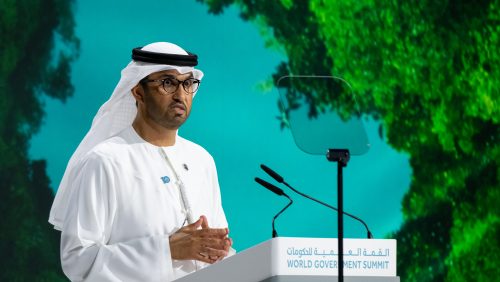The Paradox of COP28: Can Big Oil Be a Part of the Climate Solution?
October 10, 2023 by Jesse Valente

The CEO of the Abu Dhabi National Oil Company, Sultan Ahmed al-Jaber, will serve as COP28’s president.
As COP28 approaches, this article explores the controversial role of big oil in climate talks and questions whether their involvement could compromise the summit's goals for urgent climate action.
Introduction
As the world prepares for the United Nations’ COP28 climate summit, scheduled to be hosted by the United Arab Emirates (UAE), there is growing concern around the role of large fossil fuel producers in climate discussions. This concern reached a boiling point when the UAE, concurrently a significant player in the oil market and the host for the climate summit, urged the fossil fuel industry to take an active role in reducing emissions.[1] This article delves into the convoluted relationship between big oil and global climate efforts, examining whether their significant voice at COP28 might delegitimize the conference’s objectives.
The Changing Narrative
This year, the narrative around fossil fuel companies hindering climate progress seems to be shifting. Industry executives insist they should not be seen as the enemy but as crucial partners in tackling climate issues.[2] COP28’s president, Sultan al-Jaber, who also serves as the CEO of Abu Dhabi National Oil Co., exemplifies this contradictory role, sparking debates about his potential conflict of interest.[3] At the same time, emerging oil and gas producers like Uganda question the realism of emissions targets, pushing for a more “comprehensive energy transition plan that is fair, fast, just, equitable and responsible.”[4]
The Double-Edged Sword of Carbon Capture
A pertinent example of how oil-producing nations are trying to change the narrative is the UAE’s investment in Carbon Capture and Storage (CCS) technologies.[5] While these technologies may seem positive, critics argue they serve more as a band-aid than as a solution.[6] The promotion of CCS technology can lead to the false notion that it is a panacea enabling the global market to continue with business as usual. Additionally, captured carbon is often used for enhanced oil recovery, essentially recycling the carbon to extract more fossil fuels.[7]
The oil industry’s emphasis on CCS can be likened to the tobacco industry’s efforts to promote filtered cigarettes as a healthy alternative to unfiltered products in the 1950s.[8] Both scenarios offer a semblance of a solution while allowing harmful consumption patterns to continue.
The Risks of Fossil Fuel Participation in COP28
Two main risks emerge when major oil producers lobby for a more significant role in climate talks like COP28. First, the urgency for radical change may be diluted. Second, these countries may use their influence to favor policies more aligned with their economic interests rather than the planet’s ecological needs.
Questioning the Legitimacy of COP28
COP events are traditionally seen as collaborative global platforms to mitigate climate change; however, the increased participation of major fossil fuel producers poses a risk to the conference’s legitimacy. It sends a mixed message, raising questions about whether COP28 can genuinely serve as a platform for transformative action or if it will become a forum for fossil fuel giants to legitimize their continued role in a warming world.
Conclusion
As the world approaches COP28, the complex dynamics between large oil-producing countries and the conference’s climate objectives must be addressed. While these nations advocate for a more significant role in climate discussions, there is a growing concern that their participation might be about controlling the narrative and potentially delaying the much-needed energy transition. This contentious relationship puts the legitimacy of COP28 at risk, requiring us to critically examine whether these producers can ever be part of the climate solution or if their involvement is likely to dilute the urgency and effectiveness of global climate action.
In light of the challenges and risks involved, it is crucial for COP28 and future climate discussions to maintain a laser focus on radical and immediate action. Strong action cannot be bogged down by compromises that could derail the world’s climate future.
[1] See Summer Said & Benoit Faucon, Oil Producers Push for Bigger Voice in Climate Talks Ahead of COP28 Summit, Wall Street Journal (Oct. 2, 2023), https://perma.cc/3MDB-2Y3C.
[2] See id.
[3] See id.
[4] See id.
[5] See Yousef Saba, Rachna Uppal & Nick Macfie, UAE’s ADNOC to install 10 tonnes/day carbon capture unit at fertiliser plant, Reuters (Oct. 3, 2023), https://perma.cc/NUP3-XECR.
[6] See id.
[7] See Howard J. Herzog, Pumping CO2 underground can help fight climate change. Why is it stuck in second gear?, The Conversation (Mar. 12, 2015), https://perma.cc/87LM-47EM.
[8] See U.S. Department of Health and Human Services, How Tobacco Smoke Causes Disease: The Biology and Behavioral Basis for Smoking-Attributable Disease: A Report of the Surgeon General (2010), https://perma.cc/J4T5-HFWM.

